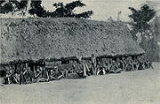
Eze Nri Òbalíke
Encyclopedia
Eze Nri Òbalíke is the 15th recorded Eze Nri of the Kingdom of Nri
in modern day southeastern Nigeria
. He is said to have ruled from around the year 1889 till 1936.
authority, Christian missionaries, saw the existing ritual system of administration, based on traditional religious faith, as a barrier to the spread of their gospel. When the British continued to take over the administration of the Igbo in 1907, both the forces of the colonial authority and the Christian missionaries focused on destroying the Nri traditional authority. Military attempts to capture Nri and the Eze Nri ended in complete failure. However, forcing Eze Nri Obalike, against a long-standing tradition, to leave Nri town to attend the native at Awka
by threatening to commit genocide against the Igbos, was one of the acts designed to achieve this end. Eze Nri Obalike agreed to leave Nri in order to save innocent lives. The government anthropologist, Northcote Thomas, confirmed that when Eze Nri Obalike appeared in the court, ‘the whole assembly rose and prepared to flee’. This is because, that was the first time an Ezenri was seen in person.
The final act of destruction, after the British introduced the warrant Chief system in 1911, was to force all chiefs and community leaders to denounce the Eze Nri. But before then, Eze Nri Obalike was also forced to annul all codes of taboo
and abomination
still binding the towns to Nri. It was as the result of this hostility that the ritual influence of Nri narrowed to the nearest relations of the kingship. These were made up of Nri (Agukwu, Akamkpisi and Diodo), Enugwu-Ukwu, Nawfia, Enugwu-Agidi and Oruora jointly referred to as Umunri. Though the five towns mentioned above are said to belong to Umu-Nri clan, they are not direct descendants of Nri Ifikuanim.
Kingdom of Nri
The Kingdom of Nri was the West African medieval state of the Nri-Igbo, a subgroup of the Igbo people, and is the oldest kingdom in Nigeria. The Kingdom of Nri was unusual in the history of world government in that its leader exercised no military power over his subjects...
in modern day southeastern Nigeria
Nigeria
Nigeria , officially the Federal Republic of Nigeria, is a federal constitutional republic comprising 36 states and its Federal Capital Territory, Abuja. The country is located in West Africa and shares land borders with the Republic of Benin in the west, Chad and Cameroon in the east, and Niger in...
. He is said to have ruled from around the year 1889 till 1936.
Nomination as Eze Nri
Obalike mentioned a dream as central to his candidacy, as signs were supposedly given to the next Eze Nri spiritually, he is quoted saying:One night Enwelana, the last Eze Nri, appeared to him and said he was the chosen man; thereupon he proceeded to offer sacrifices.
British rule
Accompanied by British colonialBritish Empire
The British Empire comprised the dominions, colonies, protectorates, mandates and other territories ruled or administered by the United Kingdom. It originated with the overseas colonies and trading posts established by England in the late 16th and early 17th centuries. At its height, it was the...
authority, Christian missionaries, saw the existing ritual system of administration, based on traditional religious faith, as a barrier to the spread of their gospel. When the British continued to take over the administration of the Igbo in 1907, both the forces of the colonial authority and the Christian missionaries focused on destroying the Nri traditional authority. Military attempts to capture Nri and the Eze Nri ended in complete failure. However, forcing Eze Nri Obalike, against a long-standing tradition, to leave Nri town to attend the native at Awka
Awka
Awka is the capital of Anambra State, Nigeria with an estimated population of 301,657 Nigerian census. The city is located about 600 miles east of Lagos in the centre of the densely-populated Igbo heartland in southeastern Nigeria...
by threatening to commit genocide against the Igbos, was one of the acts designed to achieve this end. Eze Nri Obalike agreed to leave Nri in order to save innocent lives. The government anthropologist, Northcote Thomas, confirmed that when Eze Nri Obalike appeared in the court, ‘the whole assembly rose and prepared to flee’. This is because, that was the first time an Ezenri was seen in person.
The final act of destruction, after the British introduced the warrant Chief system in 1911, was to force all chiefs and community leaders to denounce the Eze Nri. But before then, Eze Nri Obalike was also forced to annul all codes of taboo
Taboo
A taboo is a strong social prohibition relating to any area of human activity or social custom that is sacred and or forbidden based on moral judgment, religious beliefs and or scientific consensus. Breaking the taboo is usually considered objectionable or abhorrent by society...
and abomination
Abomination (Bible)
Abomination is an English term used to translate the Biblical Hebrew terms shiqquwts and sheqets, which are derived from shâqats, or the terms , tōʻēḇā or to'e'va or ta'ev...
still binding the towns to Nri. It was as the result of this hostility that the ritual influence of Nri narrowed to the nearest relations of the kingship. These were made up of Nri (Agukwu, Akamkpisi and Diodo), Enugwu-Ukwu, Nawfia, Enugwu-Agidi and Oruora jointly referred to as Umunri. Though the five towns mentioned above are said to belong to Umu-Nri clan, they are not direct descendants of Nri Ifikuanim.

